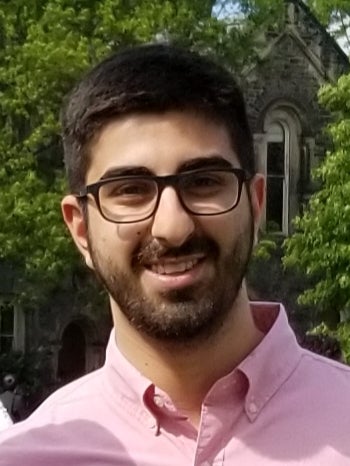
While it may not surprise most people around him that he is pursuing his PhD at the University of Toronto immediately upon completing his courses, Frank himself admits that his academic path has deviated very little from his initial plan.
“I really liked high school physics, and knew the University of Waterloo had a great physics program and of course co op, “he says. “Plus coming from the city of Toronto, a smaller town like Waterloo sounded appealing to me. I couldn’t wait to experience physics in the lab and see where that went.”
And he certainly embraced every lab experience he could get.
One of Frank’s work terms involved a paid internship with Perimeter Institute (PI) upon receiving the prestigious Mike Lazaridis Scholarship in Theoretical Physics. Frank describes his work at PI as highly numerical. “I was working on a way, using Python, to represent scalar and vector fields on the surface of a sphere using scalar and vector spherical harmonics series,” he explains. “The goal was to be able to represent the horizons of black holes that were generated in various black hole collision simulations, and then use these numerical representations to extract information about the black hole, such as the irreducible mass, spin, angular momentum, etc.” Frank further explains that his project was the initial work required to achieve this goal.
Frank admits that he was torn between which specific branch of physics to study, theoretical physics or biophysics, especially after working in the optics research lab of Professor Melanie Campbell for a year. In the Campbell lab he was part of a team collecting data to support early diagnosis of Alzheimer’s disease by comparing the number of amyloid-beta deposits, on the retina of the eye, to the disease severity — a presence which correlates to the likelihood of a person developing the disease.
He is extremely grateful for the experience and admits that Campbell had the biggest influence on his undergraduate career. “Thanks to her I was able to do some exciting work in the field of optics and Alzheimer's research, as well as present that work at my first international science conference (ARVO 2018) in Hawaii. She was always helpful and willing to give me advice about graduate school and future physics career paths."
The admiration is certainly reciprocal. Melanie Campbell had nothing but praise for her prize student, “He’s one of the best students I’ve ever known,” she says, “Not only was he outstanding in his coursework but also one of the strongest research students in the lab even though he was still an undergraduate”.
As busy as Frank was working in the lab and obtaining top grades, he wishes he had done more outside of his academics. In fact, that’s one of the biggest pieces of advice he could pass on to those starting university this fall, “get out and meet people! Take more breaks and take care of yourself”. He pauses and his tone becomes a bit less serious, “Schedule some downtime in between your studies or else you’ll be eating dinner at 1 a.m. and wondering what happened.”
Now that he has reached Convocation, Frank admits that it is a bittersweet moment after losing his father, Peter, unexpectedly as he started his final year of studies. “He was extremely proud of me and of all the hard work that I put into my physics education and would always be fascinated when I told him about all of the different things I would learn in my classes,” he recalls, “and I would not have been able to accomplish what I had without him. He would always tell me how excited he was for my graduation and I wish that he could've still been here to witness it”. Despite the loss of his father, Frank knows that the rest of his family and his girlfriend are tremendously proud of him and fully supportive of his chosen career path. He credits them for getting him through some of the most stressful moments of his life.
And so, the journey of Frank Corapi continues onward. Now a graduate of the University of Waterloo, he is working towards a PhD with Dr. Joseph Thywissen of the University of Toronto in a field that he describes as a mixture of experimental and theoretical physics. In Thywissen’s lab, Frank studies the interactions between ultracold fermionic potassium atoms, trapped within an optical lattice, by imaging them using a high-resolution quantum gas microscope.
“These atoms occupy different lattice sites within the optical lattice and can interact via quantum-mechanical tunneling between these various sites,” he explains. “These interactions are highly tunable in our setup, and we can easily control these interactions to study various properties, such as the resistivity for interacting fermions.”
Frank encourages those interested to check out his experiment on the lab’s website under "Experiment 2 — Quantum Gas Microscopy", as well as some of the other experiments going on in the lab.